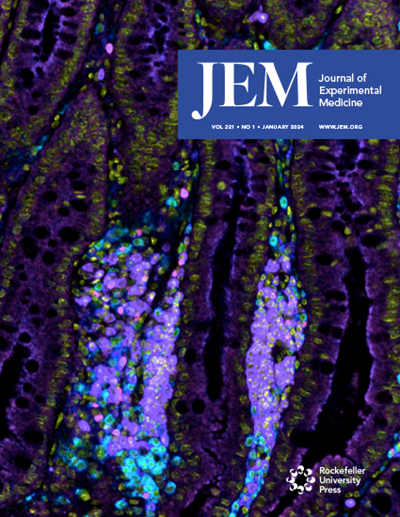CD4+ T细胞在癌症中的功能障碍。
IF 10.6
1区 医学
Q1 IMMUNOLOGY
Journal of Experimental Medicine
Pub Date : 2025-09-01
Epub Date: 2025-08-07
DOI:10.1084/jem.20241417
引用次数: 0
摘要
虽然CD8+ T细胞在成功的癌症免疫治疗中的重要性已经确立,但CD4+ T细胞越来越被认为是有效抗肿瘤免疫的关键介质。然而,肿瘤中CD4+ T细胞功能损伤的机制并不像CD8+ T细胞那样明确。在这篇综述中,我们将探讨CD4+ T细胞如何在荷瘤宿主中发生改变,将这些变化与CD8+ T细胞中观察到的变化进行比较,并讨论这些变化如何影响肿瘤控制。对抗肿瘤反应性CD4+ T细胞功能损伤的方法可能进一步提高癌症免疫治疗的疗效。本文章由计算机程序翻译,如有差异,请以英文原文为准。
CD4+ T cell dysfunction in cancer.
While the importance of CD8+ T cells in successful cancer immunotherapy is well-established, CD4+ T cells are increasingly recognized as key mediators of effective anti-tumor immunity. However, the mechanisms underlying the functional impairment of CD4+ T cells in tumors are not as well characterized as in CD8+ T cells. In this review, we will explore how CD4+ T cells are altered in tumor-bearing hosts, compare these changes to those observed in CD8+ T cells, and discuss how these changes impact tumor control. Approaches that counteract functional impairment in tumor-reactive CD4+ T cells may further enhance the efficacy of cancer immunotherapy.
求助全文
通过发布文献求助,成功后即可免费获取论文全文。
去求助
来源期刊
CiteScore
26.60
自引率
1.30%
发文量
189
审稿时长
3-8 weeks
期刊介绍:
Since its establishment in 1896, the Journal of Experimental Medicine (JEM) has steadfastly pursued the publication of enduring and exceptional studies in medical biology. In an era where numerous publishing groups are introducing specialized journals, we recognize the importance of offering a distinguished platform for studies that seamlessly integrate various disciplines within the pathogenesis field.
Our unique editorial system, driven by a commitment to exceptional author service, involves two collaborative groups of editors: professional editors with robust scientific backgrounds and full-time practicing scientists. Each paper undergoes evaluation by at least one editor from both groups before external review. Weekly editorial meetings facilitate comprehensive discussions on papers, incorporating external referee comments, and ensure swift decisions without unnecessary demands for extensive revisions.
Encompassing human studies and diverse in vivo experimental models of human disease, our focus within medical biology spans genetics, inflammation, immunity, infectious disease, cancer, vascular biology, metabolic disorders, neuroscience, and stem cell biology. We eagerly welcome reports ranging from atomic-level analyses to clinical interventions that unveil new mechanistic insights.

 求助内容:
求助内容: 应助结果提醒方式:
应助结果提醒方式:


